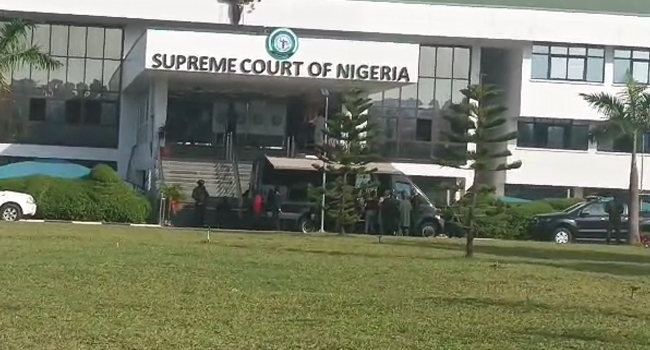The Supreme Court has thrown out a lawsuit filed by several state Attorneys General challenging the constitutionality of the Economic and Financial Crimes Commission (EFCC).
The lawsuit, which was dismissed due to lack of merit, had sought to question the legitimacy of the EFCC Act.
A seven-member panel of the apex court, led by Justice Uwani Abba-Aji, passed the judgment on Friday.
Mohammed Abdulwahab, SAN, counsel for Kogi State, which originally filed the action, pointed out that the United Nations Convention Against Corruption had been incorporated into the EFCC Establishment Act, a move he argued was inconsistent with Section 12 of the 1999 Constitution (as amended).
Section 12 partly states, “No treaty between the Federation and any other country shall have the force of law except to the extent to which any such treaty has been enacted into law by the National Assembly.”
“A bill for an Act of the National Assembly passed pursuant to the provisions of subsection (2) of this section shall not be presented to the President for assent and shall not be enacted unless it is ratified by a majority of all the Houses of Assembly in the Federation.”
Abdulwahab said the constitutional provision required a majority of the states’ Houses of Assembly to agree with their federal legislators in passing the EFCC Act and other related laws.
According to him, the requirement was not met in the establishment of the EFCC Act. He therefore urged the court to rule that the creation of the anti-graft agencies is against the law.
“I seek your Lordship’s indulgence to adopt the processes. We urge your Lordship to grant all the reliefs sought. We are also challenging the foundation of those laws that created NFIU, EFCC, etc., to avoid creating a constitutional crisis. We urge you to allow our suit and award heavy costs in favor of the Plaintiff on record,” he said.
He further urged the apex court to decide whether the EFCC Act, ICPC Act, and NFIU Act can be applied to criminalize the use of funds belonging to states and local governments. Additionally, he sought clarity on whether the EFCC, NFIU, or any other agency has the authority to investigate, summon, or arrest individuals involved in managing funds allocated to states or local governments.
On his part, the Attorney General of the Federation, Lateef Fagbemi, SAN, argued that shutting down these agencies would hinder the nationwide fight against corruption.
The court ruled that the National Assembly has the power to enact laws relating to fighting corruption, and states cannot enact laws contradicting federal laws.
The court also noted that the EFCC Act is constitutional and within the National Assembly’s legislative competence.
The apex court ruled that the first plaintiff (Kogi Attorney General) and others had exposed “a can of worms and skeletons in their cupboard” by revealing that the EFCC had invited and investigated state government officials, rather than those from the federal government. This, the court stated, exposed the “selfish motives” behind the plaintiff’s lawsuit.
“No state has the right to enact laws that contradict the statutes passed by the National Assembly,” she said.
“The plaintiff’s suit fails and is hereby dismissed in its entirety,” she added, reading out the unanimous judgment.








Leave a Comment